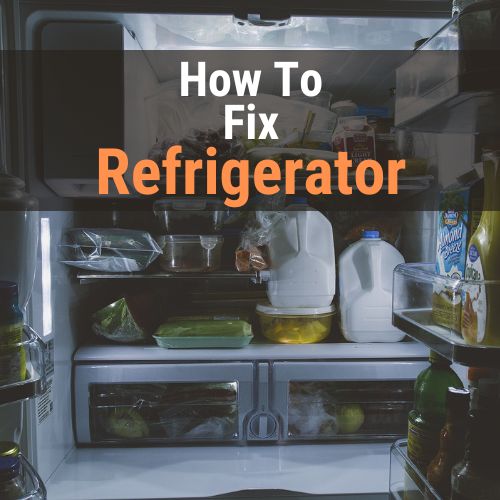When your refrigerator starts acting up, it can disrupt your daily life and potentially lead to food spoilage.
In ‘Troubleshooting Refrigerator Problems: A Step-by-Step Approach,’ we’ll guide you through the most common issues, offering clear and practical steps to diagnose and resolve these problems, ensuring your fridge stays reliable and your groceries stay fresh.
Refrigerator Common Problems
Refrigerators can encounter a range of common problems over time. Here’s a list of 30 common refrigerator problems:
- Not Cooling: The refrigerator fails to maintain a cold temperature.
- Freezer Not Freezing: The freezer compartment doesn’t freeze food properly.
- Too Cold: The refrigerator or freezer is excessively cold, causing food to freeze.
- Noisy Operation: Unusual or loud noises coming from the refrigerator.
- Leaking Water: Water leaks from the refrigerator, often due to a clogged or frozen defrost drain.
- Ice Maker Issues: Problems with ice production or dispensing.
- Ice or Frost Buildup: Accumulation of ice or frost inside the freezer or refrigerator.
- Warm Fridge, Cold Freezer: The refrigerator section is warm while the freezer is cold.
- Refrigerator Runs Constantly: The compressor runs continuously without cycling off.
- Fridge Door Seal Problems: Air leaks around the refrigerator door gasket.
- Foul Odor: A persistent bad smell inside the refrigerator.
- Water Dispenser Problems: Issues with the water dispenser, such as slow flow or no water.
- Interior Light Not Working: The refrigerator’s interior light doesn’t turn on.
- Inconsistent Temperatures: Temperature fluctuations inside the refrigerator or freezer.
- Condensation Issues: Excessive condensation on interior surfaces.
- Refrigerator Not Dispensing Water: The water dispenser doesn’t work.
- Water Filter Issues: Problems with the water filter, such as a clogged or expired filter.
- Fan Problems: Issues with the evaporator or condenser fan.
- Refrigerator Door Not Closing Properly: The door doesn’t seal properly, allowing warm air inside.
- No Power: The refrigerator doesn’t turn on or show any signs of power.
- Display/Control Panel Issues: Problems with the digital display or control panel.
- Frozen Evaporator Coils: The evaporator coils freeze over, affecting cooling.
- Leaking Refrigerant: Refrigerant leakage, which requires professional repair.
- Strange Smells: Unusual or strong odors inside the refrigerator.
- Cracked Interior Shelves or Drawers: Damage to interior components.
- Compressor Issues: Problems with the compressor, a critical component for cooling.
- Refrigerator is Too Noisy: Loud humming or buzzing noises.
- Water Under the Crisper Drawers: Water accumulates under the crisper drawers.
- Tripped Circuit Breaker: The refrigerator trips the circuit breaker or blows a fuse.
- Broken Door Handle: Damage or breakage of the refrigerator door handle.
If you encounter any of these problems with your refrigerator, consult the user manual and consider contacting a professional appliance repair technician, especially for issues related to electrical components and refrigerant.
Other Appliance Common Problems
- Washing Machine Common Problems
- Dryer Common Problems
- Dishwasher Common Problems
- Range / Oven Common Problems
You might be interested:
Troubleshooting a Refrigerator Not Cooling: Common Problems and Maintenance Tips
Samsung Refrigerator Ice Maker Troubleshooting Guide
EBR83845003 LG Refrigerator Control Board
LG Refrigerator Freezer Not Freezing: Troubleshooting Guide and Maintenance Tips
WR55X11098 GE Refrigerator Control Board
Refrigerator Leaking Water Troubleshooting Guide: Identify and Fix the Issue
2198597 Whirlpool Refrigerator Ice Maker
How to Fix Whirlpool French Door Refrigerator Not Cooling



our Samsung refrigerator is freezing everything…in refrigator and freezer is warm not working.
Hi Roxanne,
Here are some tips:
Check the Temperature Settings: Make sure the settings are appropriate for both the refrigerator and freezer. The freezer should be set to a colder temperature than the refrigerator.
Clear Air Vents: Ensure that the air vents inside the refrigerator and freezer are not blocked by food items. Blocked vents can disrupt airflow and cause uneven cooling.
Inspect the Door Seal: Check if the door seal is intact and sealing properly. A loose or damaged seal can allow warm air to enter the refrigerator, affecting its cooling ability.
Defrost the Freezer: If ice has built up inside the freezer, it could be blocking airflow and causing temperature issues. Turn off the refrigerator and let the freezer defrost completely.
Clean Condenser Coils: Dust and debris on the condenser coils can inhibit the refrigerator’s ability to cool properly. Clean the coils with a vacuum or brush to improve efficiency.
Best regards,